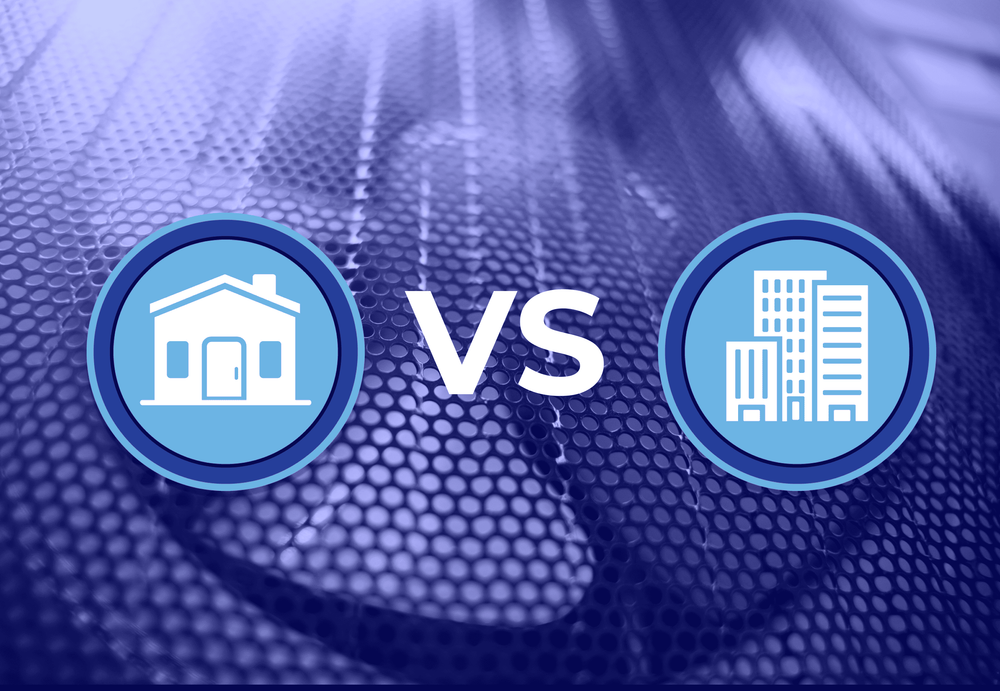Commercial vs. Residential HVAC Businesses
Discover the key differences between commercial and residential HVAC systems.
Apr 17, 2025

When it comes to HVAC careers or starting an HVAC company, one of the first decisions you’ll face is whether to focus on commercial HVAC vs residential. Each path has distinct demands, customer types, systems, and job scopes. These key differences make the commercial vs residential HVAC comparison important for both technicians and business owners. Understanding the differences between residential vs commercial HVAC work can help you determine where your strengths lie and where to focus your time and resources.
Whether you're just starting out as an HVAC technician or you're looking to grow a business that handles residential and commercial HVAC systems, let’s break down everything you need to know.
What’s the Difference Between Commercial and Residential HVAC?
At the core, HVAC residential vs commercial services have the same goal: to heat, cool, and ventilate indoor spaces efficiently. But the way that goal is achieved varies dramatically. Understanding the key differences between commercial vs residential HVAC systems is critical for success in the HVAC industry.
Residential HVAC Services
Residential HVAC work typically involves smaller, standalone air conditioning and heating and cooling systems installed in single-family homes, apartments, or condos. These residential systems are usually simpler and easier to service, often including:
- Split systems or packaged units
- One or two residential HVAC units
- Standard thermostats and air ducts
- Indoor air quality systems like HEPA filters or UV lights
Most residential HVAC technicians handle service calls for repair, maintenance, or replacement. These jobs are typically shorter and can be completed in a single visit. Residential HVAC services are in high demand, especially for residential AC and cooling systems. Regular maintenance of residential units ensures efficiency and prolongs system life.
Commercial HVAC Services
In contrast, commercial HVAC units are designed for larger, more complex spaces like commercial buildings, retail stores, office buildings, or industrial facilities. These commercial systems include:
- Rooftop packaged systems (RTUs)
- Zoned HVAC configurations
- Chillers, boilers, and cooling towers
- Advanced controls and automation systems
- Sophisticated ventilation systems
Commercial HVAC technicians often work on long-term contracts to install, maintain, or upgrade these larger HVAC systems over time. Projects may span days or even weeks and usually involve a team of techs. Commercial HVAC services may also include regular maintenance plans and service contracts with commercial customers. Commercial HVAC companies typically have the resources and staff to handle these larger commercial projects.
Type of Customers and Job Experience
The kind of customer you serve also impacts the daily experience of HVAC professionals.
Residential HVAC: Personal Interaction
Residential HVAC systems often mean interacting directly with homeowners or renters. These residential customers want quick fixes, comfort, and good customer service. As a residential HVAC technician, you’ll build trust one-on-one, often walking customers through problems and solutions.
This path is great for people who enjoy personal interaction, solving individual problems, and working independently or in small teams. Many residential technicians value this one-on-one engagement and job satisfaction. Residential clients often become repeat customers for seasonal checkups and repairs.
Commercial HVAC: B2B Relationships
In commercial HVAC, your "customer" is typically a business or property manager. You might not see the end user of the system at all. Communication tends to happen through maintenance managers or general contractors. Commercial HVAC companies often build long-term relationships with local businesses and facilities.
These jobs can offer more consistency and larger contracts, but they often involve less personal interaction and more technical documentation. Working on commercial HVAC systems also means higher responsibility due to the size and complexity of commercial units. Commercial HVAC units tend to serve larger areas with more zoning requirements and utility costs.
How to Start and Grow Your HVAC Career: From Training to Technician Paths
Whether you’re exploring the HVAC industry for the first time or considering a shift from residential to commercial HVAC work (or vice versa), understanding how to launch and grow your career is key. Let’s break down the journey, from training and certifications to real-life job profiles of HVAC technicians working in both residential and commercial roles.
Step 1: Get the Right HVAC Training
The first step in any HVAC technician’s journey is technical training. Most HVAC technicians begin by attending an HVAC trade school , where they learn the basics of system design, diagnostics, and service for both residential and commercial systems.
These programs typically take 6–12 months and combine classroom learning with hands-on experience. By the end, you should be comfortable installing and troubleshooting residential HVAC units, and you'll start to learn about more advanced commercial HVAC systems as well. Choose a training program that covers both commercial and residential HVAC skills and includes instruction on cooling equipment and HVAC units.
Step 2: Earn Your Certifications and Licenses
Before you can begin working on service calls, you’ll need the appropriate certifications.
- EPA Section 608 Certification is federally required to work with refrigerants, regulated by the Environmental Protection Agency.
- NATE Certification (North American Technician Excellence) is highly respected and may be required by employers, especially for commercial work.
- Some techs also pursue manufacturer-specific training for systems like Trane, Carrier, or Mitsubishi.
- Organizations, like ACCA (Air Conditioning Contractors of America), can provide additional resources or networking opportunities.
HVAC Certification requirements vary by state, so be sure to check that you are covered:
- HVAC license reciprocity by state if you plan to move or operate in multiple states.
Step 3: Choose a Career Path — Residential or Commercial HVAC?
Both residential HVAC techs and commercial HVAC techs play vital roles, but the day-to-day job can be very different. While residential techs focus on faster, high-volume service calls, their commercial counterparts often work on fewer but more technically demanding projects that require advanced systems knowledge. Here’s what those paths can look like in practice:
Residential HVAC Technician Roles
Most residential HVAC technicians start out handling service calls for single-family homes, apartments, or condos. Responsibilities of techs who work residential jobs often involve diagnosing issues with residential HVAC units, performing tune-ups, or replacing aging air conditioning and heating systems.
Technicians in this space typically:
- Handle multiple residential jobs per day (often 4–6 service calls)
- Work solo or with one other tech
- Communicate directly with residential clients
- Provide fast, customer-facing solutions
Residential work offers more opportunities to build customer relationships and develop strong communication skills. Many residential techs eventually pursue management roles or open their own HVAC company. Residential projects are a great entry point into the HVAC field.
Commercial HVAC Technician Roles
Commercial techs work on larger HVAC systems in commercial buildings like office parks, retail centers, warehouses, and industrial facilities. Compared to their residential counterparts, these roles typically require more advanced knowledge and experience due to the size and complexity of commercial HVAC systems.
Technicians working in commercial environments often:
- Spend extended time on a single commercial project or job site
- Collaborate with a team of technicians, engineers, or subcontractors
- Interact with facility managers or commercial customers
- Maintain, install, or upgrade systems such as RTUs, chillers, or zoning setups
Commercial work often provides higher commercial HVAC pay, and the chance to specialize in building automation or large building system integration. HVAC professionals with specialized knowledge are in high demand across commercial and residential sectors.
Step 4: Build Experience and Level Up
Most HVAC techs begin in residential HVAC work due to easier job access and faster training pipelines. It’s a great way to build skills, confidence, and a solid customer base if you’re planning to launch your own HVAC company.
Once you’re comfortable with residential projects and handling installations, you can begin exploring commercial opportunities. Employers in the commercial HVAC space often look for:
- 3+ years of hands-on experience
- Familiarity with mechanical codes and large-scale blueprints
- Specialized knowledge like working with cooling towers, chillers, or building automation
Step 5: Continuing Education and Specialization
To stay competitive and increase your earning potential, continuing education is key. You might explore:
- Certifications in green HVAC systems and energy efficiency
- Training on commercial HVAC systems like VRF, RTUs, or chillers
- Soft skills like sales training, leadership, or estimating
Many HVAC professionals advance into project management or large-scale commercial work after gaining several years of experience, particularly those who master both the commercial and residential sides of the trade.
Pay and Job Opportunities
So, how do HVAC tech salaries compare between residential and commercial sectors?
According to the U.S. Bureau of Labor Statistics, the median annual wage for HVAC technicians is around $57,000. HVAC Tech pay can vary widely based on experience, state or region, and whether you're working commercial or residential jobs. This median annual wage can serve as a baseline for evaluating career potential. For technicians looking to maximize earnings, adding certifications in energy efficiency or commercial automation can be the ultimate salary booster.
- Residential HVAC technicians may complete more service calls per day but often at a lower rate per job.
- Commercial HVAC technicians generally earn more due to the complexity and scale of their work.
Tools, Equipment, and Working Conditions
Residential Jobs
- Smaller tools and equipment
- Work in tight indoor spaces like attics and crawlspaces
- Shorter jobs, often multiple service calls per day
- Frequent driving between locations
- Residential HVAC units may require customization based on climate, humidity, or local code requirements
Commercial Jobs
- Heavy-duty equipment (lifts, cranes, commercial-grade gauges)
- Work on rooftops, mechanical rooms, and large open buildings
- Longer projects with team-based collaboration
- Less driving, more time on-site
Each has its trade-offs. Residential work offers more variety in location and customer interaction. Commercial HVAC work may mean working in the elements or on strict timelines, but with higher earning potential. HVAC units and systems in both sectors require regular maintenance and service.
Business Considerations for HVAC Companies
If you're running or starting an HVAC company , deciding between residential and commercial HVAC will shape your growth strategy.
Residential Focus
- Easier to enter the market
- Lower upfront equipment costs
- Faster job turnover, higher volume
- Requires strong focus on customer service
Commercial Focus
- Fewer but larger jobs
- Longer sales cycle
- Higher technical requirements
- Greater revenue per contract
Many HVAC companies eventually expand to handle both commercial and residential HVAC systems, giving them the flexibility to pursue a diverse customer base and adapt to demand changes. Commercial HVAC companies often win larger contracts, while residential services provide consistent leads.
Tools for Managing Residential and Commercial HVAC Jobs
Whether you're dispatching a residential HVAC technician for a quick service call or coordinating a multi-day commercial install, one thing remains the same: you need a system that keeps your team organized, your jobs on track, and your business growing.
That’s where FieldPulse comes in.
FieldPulse is a customizable, all-in-one HVAC Software to adapt to the unique way you run your HVAC business. Whether you're a small team or managing multiple crews, FieldPulse gives you the tools to work smarter, not harder.
With FieldPulse, you can:
- Schedule and dispatch your technicians with ease, including custom job tags, time blocks, and team assignments
- Build custom workflows tailored to residential or commercial jobs, from initial estimate to final invoice
- Track service calls, job progress, and team productivity in real-time
- Create estimates and invoices on-site, with pricing pulled directly from your custom pricebook
- Manage customer records and recurring service agreements without digging through paperwork
- Monitor profitability and performance using built-in reports and cost tracking tools
Whether you specialize in residential HVAC services, commercial HVAC systems, or both, FieldPulse grows with you. Its flexible tools help you scale operations, improve customer service, and run a more efficient business, your way.
Final Thoughts: Residential or Commercial—Which is Right for You?
There’s no one-size-fits-all answer in the commercial vs residential HVAC debate. If you enjoy fast-paced, people-focused jobs with lots of variety, residential work might be the perfect fit. If you prefer technical challenges and longer-term projects, commercial HVAC work could be your calling.
Remember, your HVAC career doesn’t have to be limited to one path. Many HVAC techs start in residential and grow into commercial roles. Others build businesses that offer both services. What matters most is building skills, earning trust, and choosing the work that motivates you most.
Want to grow your residential and commercial HVAC business? Book a demo with FieldPulse today and see how we help HVAC pros win more jobs and streamline their operations.


